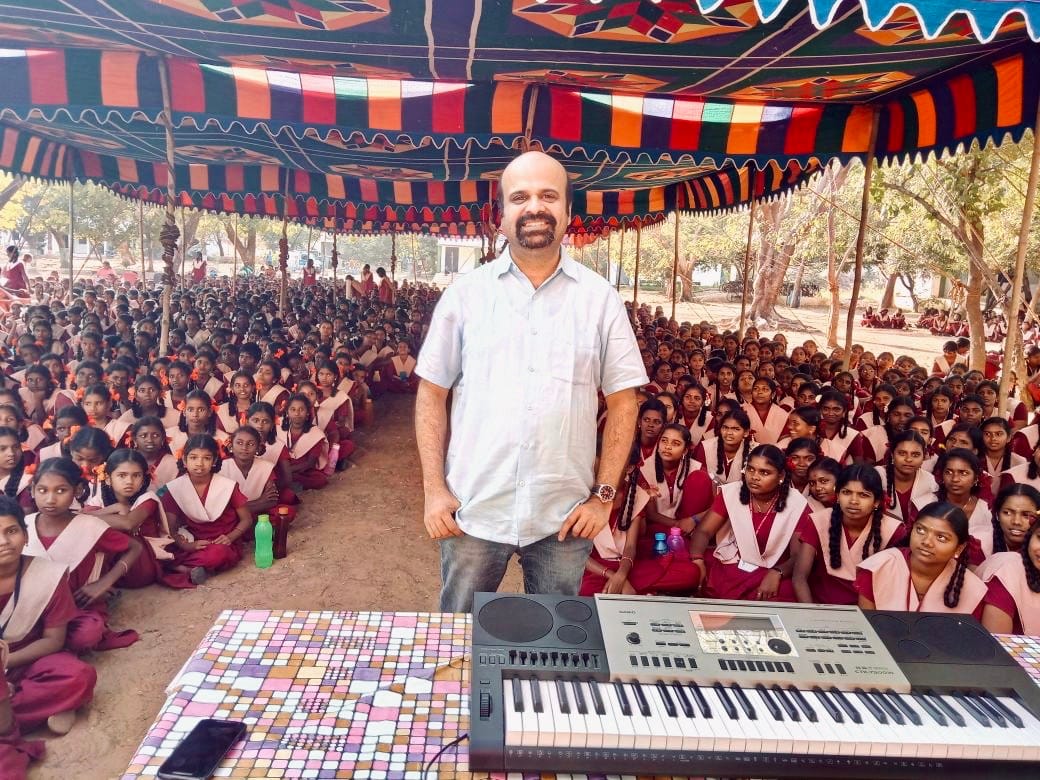Education Through Music: In Conversation with Anil Srinivasan

A musician cannot become complete with just expertise in singing or playing an instrument flawlessly. They might not even become great just by mastering one genre of music. The excellence lies in perceiving the global aspect of music and the amazing things it can do in other spheres of life. One gifted pianist and music educator, Anil Srinivasan, has been understanding this path quite actively and been successful in teaching lakhs of students all over India through his brainchild – Rhapsody. The idea of making music an essential life skill to understand other concepts of life is something groundbreaking. Before the lockdown, I had the privilege of speaking to this great musician and charming human being about music, the Rhapsody education system and many other realities of life.
Navya Chittarvu: How did you get into the education of kids from being a pianist and musician?
Anil Srinivasan: In 2010, I got Sangeet Natak Akademi Award, and following that I was visiting various school functions where I was invited. It was in one such function in the town of Thiruvarur in Tamil Nadu, (the birth place of the outstanding trio of composer-musicians of Carnatic music in the 18th century – Tyagaraja, Muthuswami Dikshitar and Syama Sastri – also known as the Trinity of Carnatic music) where I asked the children who the Trinity were. The kids said Namitha, Nayanatara and Shriya Saran. In everybody’s lives, such wakeup calls happen suddenly and for me, it happened at that particular moment. I didn’t think of how one could work towards the awareness of Carnatic music but instead thought how would children shape up in the future without music education!
From 2011-2012, I went into various classrooms across Tamil Nadu to understand what happens in a music class. My background before taking up music professionally was into cognitive neuroscience where I studied how the brain works after studying music. In a Chennai school, with a scorching heat of 42 degrees, there is no point if the children are taught songs like “Rain Rain Go Away” or “Let there be a White Christmas!”… it is such contrast. In many schools, music classes are taken off for higher standards because the management feels it is unimportant. This feels so sad because neuroscience says music affects the brain in many good ways. In school education, this is going the opposite way. That is where I understood I must do something to the field of education through music.
NC: That sounds interesting. What happened next?
AS: I thought of devising a method where music can be a source of learning – not just art but any subject. I considered the point that music should be used to teach a scientific subject like Physics or Biology. When every cognitive science says that music helps in the overall intellectual development, why can’t we use a song to teach a phenomenon like photosynthesis?
Another change I made was that every child must have access to music and should be a part of the educational curriculum. I wanted music to have the same importance as maths or the sciences. In school, we all do Physical Education but does that mean every child should become a sportsman like Virat Kohli? The same applies to music. Not every child who learns music needs to become a performing artiste. In revising and relearning, I aligned academic thought with music as the necessary skill.
We also involve language learning with music. For example, I started admiring Telugu as a language because most of Carnatic music is written in it. I feel music should be in the center of education and that’s how we started Rhapsody in the year 2013 with just a handful of teachers.
NC: How was the journey with Rhapsody? What were some of the challenges you faced?
AS: We started with just a few schools in the beginning and now the number is 477. Well, the challenges are still present. It is difficult to bring in people to understand this new take on music. Some parents these days are quite demanding and possess a strong desire for their children to excel in everything!
https://www.facebook.com/AnilSrinivasanOfficial/posts/3110423395714819
NC: Have you been in a scenario where parents come and ask you to train their students for competitions? How do you deal with such situations?
AS: We have parents coming and asking us to train their kids for reality shows. After Lydian Nadhaswaram’s victory in The World’s Best, we are actually getting more such requests. His success story has resulted in Western classical music booming in India all of a sudden. It is worrying that we have created a world in which children are pressured so much to excel in an art.
NC: Yes. Many children these days are being pushed to excel by their parents.
AS: True but it shouldn’t happen at this rate. Children go through lot of stress and tiredness because of this unnecessary pressure. When children get fame at an early age, others start dictating things for them and they forget the purpose of learning music. Even as we are living, we are taught to run right from birth till death. Nobody is realising the effect of competitiveness on people and how much pressure it brings in return.
Rhapsody on the other hand, is teaching all the opposite things as of now. We are teaching to walk, not to run in the rat race. We are teaching the kids to smile, not to laugh uncontrollably. We are teaching the students to savour, experience and become more laid back in life.
NC: What does a typical lesson in Rhapsody entail?
AS: If I want to teach the doppler effect to students in which sound is heard loudly when nearby and fades away when it goes away – we do that lesson in the third or fourth grade. In the first five minutes of the class, an icebreaker is done by the teacher by giving a rhythm exercise that engages the children. We also work on making the children use the energy productively. I wrote a song on the doppler effect and this is done by practically dividing the students into groups and demonstrating with ease. A lesson learnt like this cannot be forgotten in life. The songs are written in multiple languages though I first wrote them in English.
NC: So, you are incorporating music to be a life skill!
AS: Exactly.
NC: How do you hire teachers for this challenging work?
AS: It is a very interesting process. Initially, I took trained teachers who couldn’t actually understand the purpose of Rhapsody. We started taking graduates in any discipline who have little exposure to music. We needed to have teachers who had a good attitude towards children and we provide the musical training which is required.
NC: There is absolutely no categorisation of musical genres in Rhapsody?
AS: No. The Jazz Legend Duke Ellington said that there are only two kinds of music in this world – good music and the other kind. We call it multi-lingual, multi-disciplinary, and multi-genre.
NC: How do the students receive such classes usually?
AS: They take it with great enthusiasm and vigour. I feel that anything which is taught with a tinge of fun is received in this way. As I told about the typical class earlier, it sure sounds like fun doesn’t it?





